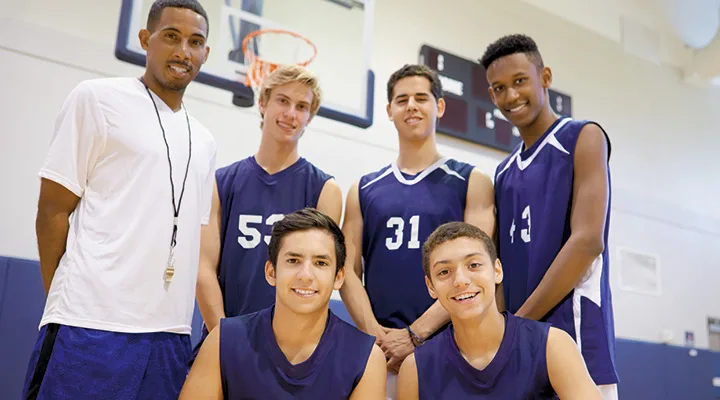Teamwork First: What Basketball Schools Teach
Basketball is more than just a sport—it is a life lesson in teamwork, discipline, and personal growth. In basketball schools around the world, aspiring players are taught not only how to dribble, shoot, and defend, but also how to collaborate with others on and off the court. This article delves into the core lessons of teamwork taught in basketball schools and how these lessons extend beyond the game itself.

The Foundation of Teamwork
In basketball, success depends on the collective effort of all five players on the court. No single player, no matter how skilled, can single-handedly win a game. This is the first and most important lesson basketball schools teach: teamwork is the foundation of success.
Coaches emphasize the importance of communication, mutual respect, and trust among teammates. Through various drills and team exercises, players learn how to pass the ball effectively, cover for each other defensively, and make decisions that benefit the team rather than focusing on individual glory.
Communication: The Key to Victory
Effective communication is vital in basketball. On the court, players must constantly talk to each other, whether calling out screens, setting up plays, or giving defensive instructions. In basketball schools, young athletes are taught that clear and concise communication helps avoid mistakes and maximizes the team’s efficiency.
Off the court, communication fosters camaraderie, helping teammates understand each other better and forming bonds that are essential to team chemistry. By building these skills in practice, players can seamlessly translate them into game situations.
Trust and Support
Trust is another essential element taught in basketball schools. Players must trust that their teammates will be where they are supposed to be on the court, execute plays correctly, and make sound decisions under pressure.
This trust is cultivated through hours of practice, where players develop a sense of each other’s strengths and weaknesses. Coaches foster an environment where players support each other, even when mistakes are made. Encouraging positive reinforcement helps build a team-first mentality, reinforcing the idea that individual success comes second to team achievement.
Team Drills and Exercises for Building Chemistry
To instill the values of teamwork, basketball schools utilize a variety of drills specifically designed to improve coordination and team chemistry. Some of the most common exercises include:
Passing Drills
Passing drills focus on improving the accuracy and timing of passes between teammates. These drills often require players to move quickly, make split-second decisions, and trust that their teammates will be ready to receive the ball. The ability to anticipate each other’s movements is crucial for maintaining ball control and creating scoring opportunities.
Defensive Drills
Team defense is a cornerstone of basketball, and it requires everyone on the court to work together. Coaches often emphasize help defense, where players rotate to cover an open opponent when a teammate is beaten off the dribble. By practicing these scenarios, players learn how to act as a cohesive unit and limit the opposing team’s scoring chances.
Team Scrimmages
Scrimmages are mock games where players are split into teams to simulate real game situations. These allow players to apply the skills they’ve learned in a competitive setting. Coaches often use scrimmages to highlight the importance of positioning, spacing, and communication, as players experience firsthand how these elements affect team performance.
Building Leadership and Responsibility
In addition to teamwork, basketball schools also place a strong emphasis on leadership and personal responsibility. Coaches identify potential leaders within the team and encourage them to take on more significant roles, whether as captains or vocal leaders during practices and games.
Leading by Example
Leadership in basketball often comes in the form of setting an example through hard work, dedication, and commitment. Players are taught to lead not by words alone but by actions. A strong leader is often the first one at practice and the last one to leave, showing teammates the value of putting in extra effort.
Accountability
Players are also taught to take responsibility for their actions on the court. Whether it’s owning up to a missed defensive assignment or taking the initiative to improve a weak aspect of their game, accountability is a crucial lesson. Coaches encourage players to hold themselves and their teammates to high standards, fostering a culture of continuous improvement.
Life Lessons Beyond Basketball
The skills and values taught in basketball schools go beyond the court. Teamwork, communication, trust, and leadership are all qualities that players carry with them into other aspects of their lives, including school, work, and personal relationships.
Adaptability and Problem-Solving
Basketball is a fast-paced game where situations can change in an instant. Players are taught to think quickly, adapt to new circumstances, and work together to overcome challenges. These problem-solving skills are invaluable in any setting, teaching students to remain calm under pressure and find solutions collectively.
Respect and Sportsmanship
Basketball schools also emphasize the importance of respect for opponents, coaches, and the rules of the game. Winning is important, but playing with integrity and sportsmanship is paramount. Players learn to respect different roles within a team, understanding that everyone contributes to the team’s success in their own way.
Conclusion
Basketball schools provide more than just technical training—they instill life lessons in teamwork, leadership, and responsibility. These lessons shape not only skilled basketball players but also well-rounded individuals prepared for success in life. Whether they go on to play professionally or pursue other careers, the values learned on the basketball court remain with them, helping them navigate life’s challenges with the same determination, collaboration, and respect that basketball demands.


